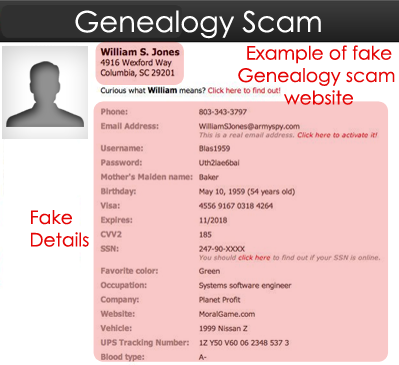Genealogy Scams
The barrier of your ancestral research:
We search for our genealogical roots for several reasons; it might be to determine the history of our ancestors, trace the risk of hereditary diseases, settle questions of land ownership, or obtain genealogical proof of a family connection for potential heirs. These are valid reasons for anyone to explore their ancestral truths. Many people stay in touch with online genealogical websites to satisfy their curiosity about their family tree. Seeking help from such websites for these sensitive matters might work for those who are aware of internet scams—but not for everyone. In this technology-driven
Fake genealogical websites are the starting point:
Genealogy scammers set up fake genealogical websites with the intention of scrutinizing your financial and personal information. They actively look for people who are interested in ancestral research and tempt them to register on their bogus sites. All they make you do is pay a huge sum of money for baseless genealogical results that are, in most cases, not even true. Not only do they squander your money, but they also mine all your personal details, making you a victim of identity theft. If you show disinterest in registering, they may approach you through your personal email, claiming that you have access to a million-dollar property belonging to your great-great-grandfather who lived overseas. The conversation usually ends with either getting you registered or convincing you to send a significant fee to claim property that never reaches you.
The worst part of a genealogy scam is that the email you receive is not only sent to you, but also to hundreds of thousands of people around the world who share your surname—and whoever contacts them first is most likely to get scammed first.
How to spot heir hunt scammers:
Genuine family tree hunters will not contact you through email or chat; they will either reach out to you in person, make a phone call, or send a letter. They will be ready to offer proper counseling before starting the search process and will not hesitate to arrange direct meetings. In contrast, bogus online scammers will never be willing to see you in person. They insist that all transactions be conducted online. They make you pay upfront for their service and then send you an email containing only the name and a fake address of an ancestor—one often entirely fabricated by the scammers themselves.











